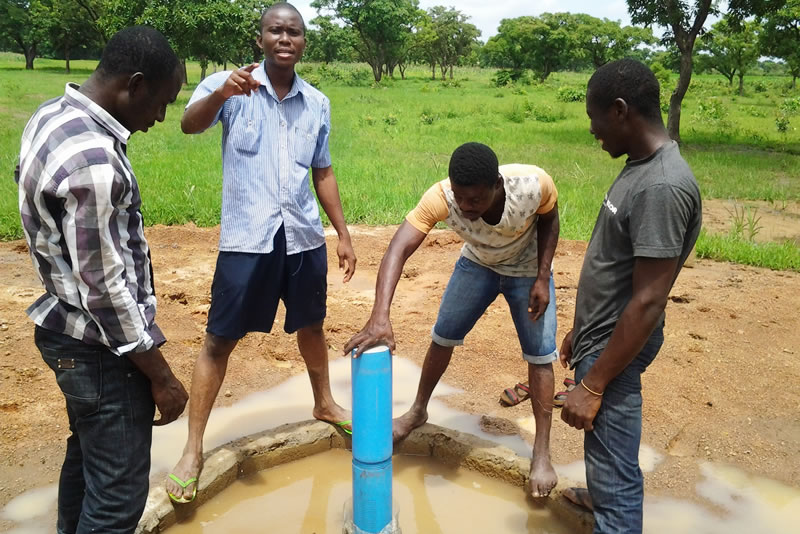
PAVE Irrigation Project
The Northern regions are considered part of the bread basket regions (BBR) of Ghana. The area has the potential to provide the bulk of the country’s food and industrial raw material requirements. Despite this potential, smallholder farmers are vulnerable to droughts, floods, pests and diseases, and other natural threats.
With increasing frequency, duration and severity of drought conditions across much of the African continent, smallholder farmers are looking for new ways to ensure that their harvests are secured against the erratic rainfall pattern. It is in this light that Conservation Alliance in collaboration with PAVE Irrigation Systems (PIS) is promoting PAVE Irrigation Technology (PIT) among smallholder farmers in the Northern Region of Ghana.
PAVE Irrigation Technology is a German originated rain water harvesting, aquifer recharge irrigation technology that injects excess water underground during periods of rainy days and floods. This is aimed at storing water for dry season farming, and also supplementing irrigation during short rainy periods. Depending on the prevailing soil layers, and the nature of aquifer, one unit of PIT has the capacity to inject an estimated 4-40 million liters of water underground. This water can be stored in the soil for up to 180 days, and thus assures farmers of at least 6months of irrigation. The construction of PIT inculcates multiple layers of carbonization, this is to enhance the purification of water being injected, to enhance its safe use by humans.
PIT is a context based technology, which means;
- Its design, development and installation is dependent on the soil, geological and hydrogeological and general environmental conditions of the project area.
- All materials needed in the development of the PIT can be obtained from any country in the world, and thus Ghana/Africa.
- In accessing water from PIT, simple pumps are required, and the use of pumps is a common practice among smallholder farmers in Northern Ghana.

PIT is a context based technology, which means;
- Its design, development and installation is dependent on the soil, geological and hydrogeological and general environmental conditions of the project area.
- All materials needed in the development of the PIT can be obtained from any country in the world, and thus Ghana/Africa.
- In accessing water from PIT, simple pumps are required, and the use of pumps is a common practice among smallholder farmers in Northern Ghana.
In the construction of PIT, there are two main things (among others) that are considered;
- Wet fracture in the soil that is less saturated, or contains less amount of water with opportunities to hold more.
- Water Aquifer where the rain flood water can be injected or added up to the underground water.
In terms of water extracted from the injection pipe, or through an alternative pipe, which is drilled in correlation with the soil strata of the injection pipe.
Furthermore, the PIT is a gender centric technology in the following way;
- It is labour saving for women, because it provides them water on their farms and thus saves the energy and time in travelling long distances in accessing water.
- The usage of PIT requires pumps which is a current practice among smallholder farmers
- The PIT promotes communal ownership of assets (among women and men)
- The PIT is a sure irrigation guarantee for the smallholder farmers, due to no occurrence of evaporation of water

PIT can play a key role in increasing crop yields, conserving water, and creating a source of income for smallholder farmers in rural communities, creating a ‘triple-win’ towards more sustainable development. Our model is built from a low-cost design, making it affordable to even the poorest farmers. By implementing drip-irrigation, smallholder farmers are able to increase the variety of crops on their farms and produce higher yields, resulting in greater food security and income opportunities.
For more information, visit Paveirrigationsytem.com